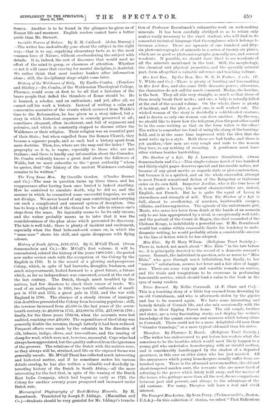History of South. Africa, 1691 - 1795. By G. M`Call Theal. (Swan
Sonnenschein and Co.)—Mr. M`Call's first volume, it will be remembered, related the history of the years 1486-1691; the period now under review ends with the occupation of the Colony by the English in 1795. It is the record of a glowing and prosperous Colony, which, in spite of bad harvests, droughts, bushmen, and much misgovernment, looked forward to a great future, a future which, as far as independence was concerned, ceased at the end of the last century. The Dutch, though much troubled by the natives, had few disasters to check their career of trade. We read of an earthquake in 1695, two terrible outbreaks of small- pox in 1713 and 1755, a great gale in 1722, and the war with England in 1780. The absence of a steady stream of immigra- tion doubtless prevented the Colony from becoming populous ; still, the revenue increased from £5,000 in the last years of the seven- teenth century, to £8,000 in 1713, £12,000 in 1756, .217,000 in 1781 ; finally, for the three years 1792-94, when the accounts were last audited, reaching over £30,000. The expenditure of the Colony was generally double the revenue, though latterly it had been reduced. Frequent efforts were made by the colonists in the direction of silk, tobacco, indigo, olives, and tree-culture, and the rearing of sheep for wool, which were not, however, successful. Cape wine had always been appreciated, but the quality suffered from the ignorance of the growers. The relations of the Dutch with the natives were, as they always will be, strained, and life on the exposed farms was generally unsafe. Mr. M'Call Theal has collected much interesting and historical matter, and if he sometimes makes his various details overlap, he has also written a valuable and decidedly in- teresting history of the Dutch in South Africa,—all the more interesting for the fact that, in spite of the waning of the Dutch East India Company, which had begun as early as 1723, the Colony for another seventy years prospered and increased under Dutch rule.


















































 Previous page
Previous page